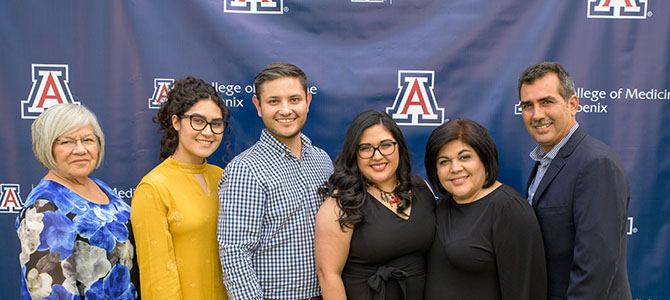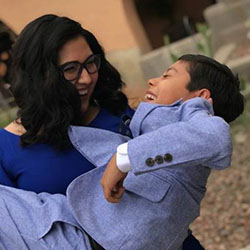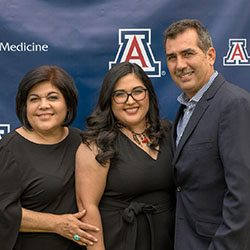
White Coat Profile: Estefania Lopez

The White Coat Ceremony marks the first time a medical student will don his or her white coat, the defining symbol of a physician. The coat bestows a great honor, and with it comes a responsibility to uphold the trust of every patient they will encounter. The Class of 2023 will receive their white coats Friday, July 19, during a ceremony that begins at 3:30 p.m. at Symphony Hall in downtown Phoenix.
Meet Estefania Lopez

Lopez suffers from asthma and a severe peanut allergy, which often left her sitting inside with her nebulizer next to her, watching from the window as her cousins lit fireworks in the middle of the dirt road in Mexico.
She was diagnosed with a peanut allergy as a child after her throat became swollen and she had trouble breathing. Her mother took her to a hospital in Mexico and she subsequently went to the U.S. for a follow-up appointment with a primary care physician. Her mother understands English, but did not have good speaking abilities, so she was assigned an interpreter who described Lopez’s allergic reaction as a mild rash instead of a severe breathing issue. The inability to communicate with the physician made her feel frustrated and defeated. This wasn’t the first time it happened, and it wasn’t the last, but it was what inevitably led the family back to Mexico to seek treatment.
“In Mexico, they would listen to us, understand our culture, speak our language and most importantly, explain what was going on and why,” Lopez said. “This is one of my biggest motivators for me to become a bilingual physician. I want to be there for those patients who are underserved, who need to be heard and empower them when they seek health care. I want to be able to bridge the gap for these families to help them understand and be involved in their care.”
Lopez received a bachelor of science in biochemistry, a bachelor of arts in Spanish translation and interpretation, and a master of medical studies from the University of Arizona. She graduated from San Luis High School in San Luis, Arizona.
Support System

She asked her mother how she will feel when her daughter dons a white coat for the first time. She said her mother started to tear up, saying it means “everything for all the hard work, the sleepless nights and the sacrifices that everyone has made.”
“They have given up so much for me to have this life, and you can’t just say thank you. That’s not enough,” Lopez said.
Pathways Scholar Program
Lopez was part of the 2018 cohort of the College of Medicine – Phoenix Pathway Scholars Program for Arizona residents who desire to pursue a career in medicine. The program is designed for students who have experienced unique or greater-than-average challenges in preparing to become a competitive medical school applicant.
Lopez said she applied to the program because it highlights people from rural areas and who are from underrepresented minority groups.
“It really embodies the type of physician I want to be and the type of physicians I want to surround myself with,” she said. “This cohort of (Pathway) students is incredibly diverse and has become my family. I couldn’t imagine my path to medicine being any different.”
What does the white coat mean to you?
“It’s an honor and a privilege and it shouldn’t be taken for granted," Lopez said. "It symbolizes a reminder to first and foremost respect your patients, their families, everyone around you and to respect the profession. To me and to my family, it is an opportunity to be able to move one step closer to my dream of becoming a physician and to be able to serve the community.”
About the College
Founded in 2007, the University of Arizona College of Medicine – Phoenix inspires and trains exemplary physicians, scientists and leaders to advance its core missions in education, research, clinical care and service to communities across Arizona. The college’s strength lies in our collaborations and partnerships with clinical affiliates, community organizations and industry sponsors. With our primary affiliate, Banner Health, we are recognized as the premier academic medical center in Phoenix. As an anchor institution of the Phoenix Bioscience Core, the college is home to signature research programs in neurosciences, cardiopulmonary diseases, immunology, informatics and metabolism. These focus areas uniquely position us to drive biomedical research and bolster economic development in the region.
As an urban institution with strong roots in rural and tribal health, the college has graduated more than 1,000 physicians and matriculates 130 students each year. Greater than 60% of matriculating students are from Arizona and many continue training at our GME sponsored residency programs, ultimately pursuing local academic and community-based opportunities. While our traditional four-year program continues to thrive, we will launch our recently approved accelerated three-year medical student curriculum with exclusive focus on primary care. This program is designed to further enhance workforce retention needs across Arizona.
The college has embarked on our strategic plan for 2025 to 2030. Learn more.